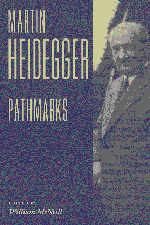Book contents
- Frontmatter
- Dedication
- Contents
- Editor's Preface
- Preface to the German Edition
- Comments on Karl Jaspers's Psychology of Worldviews (1919/21)
- Phenomenology and Theology (1927)
- From the Last Marburg Lecture Course (1928)
- What Is Metaphysics? (1929)
- On the Essence of Ground (1929)
- On the Essence of Truth (1930)
- Plato's Doctrine of Truth (1931/32, 1940)
- On the Essence and Concept of Φύσιζ in Aristotle's Physics B, I (1939)
- Postscript to “What Is Metaphysics?” (1943)
- Letter on “Humanism” (1946)
- Introduction to “What Is Metaphysics?” (1949)
- On the Question of Being (1955)
- Hegel and the Greeks (1958)
- Kant's Thesis about Being (1961)
- Notes
- References
- Editor's Postscript to the German Edition
Postscript to “What Is Metaphysics?” (1943)
- Frontmatter
- Dedication
- Contents
- Editor's Preface
- Preface to the German Edition
- Comments on Karl Jaspers's Psychology of Worldviews (1919/21)
- Phenomenology and Theology (1927)
- From the Last Marburg Lecture Course (1928)
- What Is Metaphysics? (1929)
- On the Essence of Ground (1929)
- On the Essence of Truth (1930)
- Plato's Doctrine of Truth (1931/32, 1940)
- On the Essence and Concept of Φύσιζ in Aristotle's Physics B, I (1939)
- Postscript to “What Is Metaphysics?” (1943)
- Letter on “Humanism” (1946)
- Introduction to “What Is Metaphysics?” (1949)
- On the Question of Being (1955)
- Hegel and the Greeks (1958)
- Kant's Thesis about Being (1961)
- Notes
- References
- Editor's Postscript to the German Edition
Summary
[99] The question “What is metaphysics?” remains a question. For those who stay with the question, the following postscript is a more originary foreword. The question “What is metaphysics?” questions beyond metaphysics. It springs from a thinking that has already entered into the overcoming of metaphysics. It belongs to the essence of such transitions that, within certain limits, they must continue to speak the language of that which they help overcome. The special occasion on which the question concerning the essence of metaphysics is discussed should not mislead us into the opinion that such questioning must necessarily take its point of departure from the sciences. Modern research, with its different ways of representing beings and its different means of producing them, has assumed the fundamental trait of that truth which characterizes all beings by the will to will, itself prefigured by the appearance of the “will to power.” Understood as a fundamental trait of the beingness of beings, “will” is the equating of beings with the actual, in such a way that the actuality of the actual comes to power in the unconditional attainability of pervasive objectification. Modern science neither serves a purpose first assigned to it, nor does it seek a “truth in itself.” As a way of objectifying beings in a calculative manner, modern science is a condition posited by the will to will itself, through which the will to will secures the dominance of its essence.
- Type
- Chapter
- Information
- Pathmarks , pp. 231 - 238Publisher: Cambridge University PressPrint publication year: 1998
- 2
- Cited by



